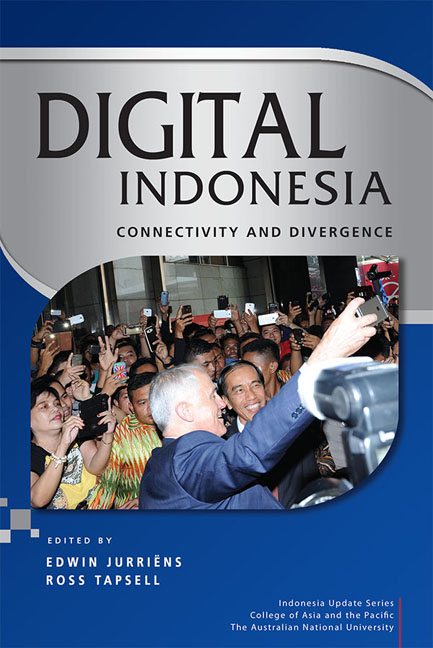Book contents
- Frontmatter
- Contents
- Tables
- Figures
- Contributors
- Acknowledgments
- Glossary
- Map of Indonesia
- 1 Challenges and opportunities of the digital ‘revolution’ in Indonesia
- PART 1 CONNECTIVITY
- PART 2 DIVERGENCE
- PART 3 IDENTITY
- PART 4 KNOWLEDGE
- PART 5 COMMERCE
- 13 Indonesia and the digital economy: creative destruction, opportunities and challenges
- 14 A recent history of the Indonesian e-commerce industry: an insider's account
- 15 The Go-Jek effect
- Index
- Indonesia Update Series
15 - The Go-Jek effect
from PART 5 - COMMERCE
Published online by Cambridge University Press: 12 January 2018
- Frontmatter
- Contents
- Tables
- Figures
- Contributors
- Acknowledgments
- Glossary
- Map of Indonesia
- 1 Challenges and opportunities of the digital ‘revolution’ in Indonesia
- PART 1 CONNECTIVITY
- PART 2 DIVERGENCE
- PART 3 IDENTITY
- PART 4 KNOWLEDGE
- PART 5 COMMERCE
- 13 Indonesia and the digital economy: creative destruction, opportunities and challenges
- 14 A recent history of the Indonesian e-commerce industry: an insider's account
- 15 The Go-Jek effect
- Index
- Indonesia Update Series
Summary
Worldwide, debate is raging over the growth of app-based transport ser-vices as companies like Uber transform the way transport is provided and how consumers access it (Isaac 2014; Aloisi 2015). Often referred to as ‘ride-sharing’ or ‘peer-to-peer’ services, these companies connect passengers with drivers typically not formally registered for taxi work or car hire services through a smartphone app. Passengers pay a set rate, determined by the company, from which a percentage is deducted before the driver receives the rest.
Like other large countries in Southeast Asia, Indonesia has enthusiastically embraced app-based transport services. Indeed, Indonesian consumers have adopted app-based transport services with alacrity, hailing cars, motorcycle taxis (ojek) or even the noisy three-wheel vehicles known as bajaj with just a few taps on their phones. The proliferation of what is known locally as ‘online transport’ (transportasi online) has benefited from commuters’ increasing frustration with traffic congestion and poor public transport, as well as the growing use of smartphones.
One of the most popular app-based transport services operating in Indonesia is Go-Jek, a locally owned venture whose drivers’ signature green helmets and jackets can be seen on the streets of most major cities across the archipelago.1 Such has been the rise of Go-Jek that it is not so much a form of transport as a phenomenon. As one journalist observed, ‘school children, university students, office workers, even the governor of Jakarta … everyone is talking about Go-Jek’ (Kompas, 18 June 2015).
Even President Joko Widodo (Jokowi) is on record as a strong supporter of Go-Jek, having invited its chief executive officer to accompany him to the United States to sell Indonesia's digital potential (Tribun News, 22 October 2015). Jokowi's confidence proved to be justified, with Go-Jek raising $550 million in new capital in 2016 (Digital News Asia, 5 August 2016).
The introduction of this ‘disruptive technology’ by Go-Jek and others has not, however, been without its challenges.2 Indonesian consumers may have embraced it, but there has been fierce resistance to Go-Jek and other app-based transport services from conventional transport providers, who have pressured authorities to rein in online providers.
- Type
- Chapter
- Information
- Digital IndonesiaConnectivity and Divergence, pp. 275 - 288Publisher: ISEAS–Yusof Ishak InstitutePrint publication year: 2017



